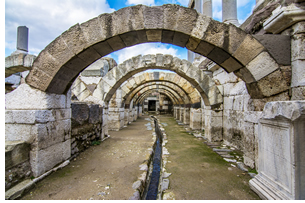Through Suffering to Glory
An interpretation of the last book of the Bible. Part 18. Revelation 2:8-11.
“And unto the angel of the church in Smyrna write; These things saith the first and the last, which was dead, and is alive; I know thy works, and tribulation, and poverty, (but thou art rich) and I know the blasphemy of them which say they are Jews, and are not, but are the synagogue of Satan. Fear none of those things which thou shalt suffer: behold, the devil shall cast some of you into prison, that ye may be tried; and ye shall have tribulation ten days: be thou faithful unto death, and I will give thee a crown of life” (Rev 2:8-11).
 Founded by Alexander the Great, the Smyrna of that time was a beautiful, affluent, commercial city in Asia Minor. A poor, harassed church of believers in the Lord Jesus Christ lived there. Significantly, Smyrna means “myrtle tree,” “myrrh,” or “bitterness.” The children of God experienced many bitter and difficult things there.
Founded by Alexander the Great, the Smyrna of that time was a beautiful, affluent, commercial city in Asia Minor. A poor, harassed church of believers in the Lord Jesus Christ lived there. Significantly, Smyrna means “myrtle tree,” “myrrh,” or “bitterness.” The children of God experienced many bitter and difficult things there.
In the Old Testament, myrrh first had to be crushed before it could be smoked into a lovely fragrance for the Lord on the golden incense altar. In the same way the church in Smyrna (and we too, like those believers) must be pounded, broken, and crushed. This way our prayer may be, in essence, an offering of ourselves: becoming a lovely fragrance to the Lord. Smyrna was the city of martyrs. The church father Polycarp would later be burned on the slope of the hill Pagus there. In the same place, the ground was soaked with the blood of 1,500 witnesses of Jesus who were simultaneously executed, and another 800 later. The Lord turned His eyes to this city, because one of His churches was facing great challenges there during the time when John was on Patmos.
First, the Lord lets this church know, “I know thy works…” Strangely enough, He doesn’t summarize these works. This contrasts with the letter to the church in Ephesus, in which He wrote, “I know thy works, and thy labour, and thy patience, and how thou canst not bear them which are evil: and thou hast tried them which say they are apostles, and are not, and hast found them liars: And hast borne, and hast patience, and for my name’s sake hast laboured, and hast not fainted” (vv. 2-3).
Our God sees through the quantitative achievements to what’s essential. Although the Lord said to Smyrna, “I know thy works,” it doesn’t seem to be doing anything. The opponents of the church in Smyrna seem to be taking the initiative in this regard, and the church is suffering from what they’re doing to it. But this is precisely where their highest activity lies! It is in resemblance to the Lord Jesus, who did the greatest work by leaving the action to the enemy.
When the Lord Jesus began His greatest work, He attested to His disciples: “This is your hour, and the power of darkness” (Luke 22:53b). He stretched out His hands and allowed Himself to be bound. He said to Pilate, “Thou couldest have no power at all against me, except it were given thee from above” (John 19:11a). So, Pilate got the initiative so that Jesus could do the very greatest thing.
Yield the initiative, the ability to act, so that the Lord can act through you and do great things through you!
“I know thy works, and tribulation.” The Lord knows about everything—including your trials and tribulations. But isn’t that precisely the reason that he describes Himself as “the first and the last, which was dead, and is alive” in the introduction to this letter? He’s saying to His intimidated little flock, “I was in great distress before you. Your affliction is my affliction. But the enemy who is harassing you never has the last word. I am the first and the last. If you collapse, I’ll spread my arms and be with you. I died and, behold, I’m alive. And you have to partake of my death so that you can live.”
“I know thy works, and tribulation.” The Lord valued the invisible works of Smyrna’s suffering believers so highly! He measures His own by completely different standards than we do. He told the wonderfully active church in Ephesus with great seriousness, “Repent … or else I will come unto thee quickly, and will remove thy candlestick out of his place, except thou repent” (Rev 2:5).
The church in Ephesus was in mortal danger, spiritually speaking, because it was about to leave its first love. We too are in the greatest danger of death when spiritual complacency creeps in. Smyrna was in need; Ephesus was not. Our need is that we have no need. The Lord wasn’t worried about the poor and suffering church in Smyrna, although it probably consisted only of people from the lower classes of the rich, industrial city. Believers were intimidated and ridiculed. They were severely challenged by false teaching, and their lives were threatened by the authorities. They looked toward the things to come with great fear. This is precisely the reason that the Lord didn’t reprimand this church on the verge of collapse, but prepared promises and wonderful comforts for it. Isn’t it perfectly poignant that the exalted Lord of verse 9 tends to every need with tender care, yes, and overlooks/forgets nothing? “I know thy works, and tribulation.”
The works were tribulation for Jesus’ sake. Their souls were working for Jesus’ sake. How close you are to Jesus when you suffer for His sake; when you willingly allow yourself to be led into the fellowship of His sufferings! Then He bends down to you and says, “I know thy works, and tribulation.” Who could know better than He? He experienced the hours of silence before the people, and being nailed to the cross. When He hung upon the cross, he was unable to move His hands to place them on anyone. But I repeat: It was there that He did His greatest work! Adolf Pohl rightly said, “What action in the Passion!”
Therefore, it must have been like balm to the church in Smyrna to hear Him say,
“I know thy works, and tribulation.” Likewise, when He said, “which was dead, and is alive.” He is speaking from the glory that He came to after His suffering. And, because of this, He calls out to the church in Smyrna, “Fear none of those things which thou shalt suffer” (v. 10a). Through suffering one arrives at glory. Yes, the measure of your suffering for Jesus’ sake determines the measure of your future glory. This is how Paul puts it: “For our light affliction, which is but for a moment, worketh for us a far more exceeding and eternal weight of glory; While we look not at the things which are seen, but at the things which are not seen: for the things which are seen are temporal; but the things which are not seen are eternal” (2 Cor 4:17-18).
It is moving that the Lord Himself determines the degree of tribulation the church in Smyrna experiences, and also says to them, “behold, the devil shall cast some of you into prison, that ye may be tried; and ye shall have tribulation ten days” (Rev 2:10). So, it’s measured precisely; the Lord doesn’t let the measure overflow (cf. 1 Cor 10:13), but ensures that His children don’t despair. It says, “that ye may be tried.” Peter also means the same thing when he says in his first letter, “Wherein ye greatly rejoice, though now for a season, if need be, ye are in heaviness through manifold temptations: That the trial of your faith, being much more precious than of gold that perisheth, though it be tried with fire, might be found unto praise and honour and glory at the appearing of Jesus Christ” (1 Pet 1:6-7).
Midnight Call - 04/2021


